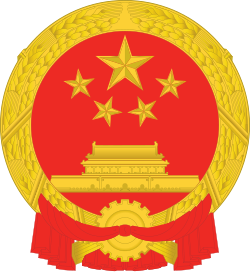Chinese government agency overseeing law-related matters
For other uses, see Ministry of Justice of China (disambiguation).
| 中华人民共和国司法部 | |
 | |
 Logo of the Justice Administrative Organs of the PRC | |
 The Ministry of Justice building in Beijing | |
| Agency overview | |
|---|---|
| Formed | September 1954;71 years ago (1954-09) |
| Type | Constituent Department of the State Council (cabinet-level) |
| Jurisdiction | Government of China |
| Headquarters | 41 Ping'anli West Street, Xicheng District, Beijing |
| Minister responsible | |
| Parent agency | State Council |
| Website | moj.gov.cn chinalaw.gov.cn |
The Ministry of Justice of the People's Republic of China is a government ministry under the State Council responsible for legal affairs.
Contents
The Central People's Government established the Ministry of Justice in October 1949. The ministry assumed its current form in September 1954. In 1959, the Ministry of Justice, along with judicial administrative organs, was abolished. It was restored in 1979. The ministry's range of responsibilities include judicial process, drafting legislation, developing legal framework, participating in national and international treaties, prosecution and sentencing.
